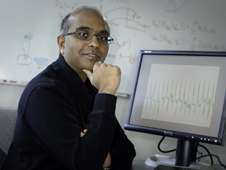Ames Researcher Makes Flying Safer

(PhysOrg.com) -- It's comforting to know that when you board a commercial airline Ames Researcher Ashok Srivastava is working to ensure that you enjoy a safe flight.
Srivastava, a scientist at NASA’s Ames Research Center, Moffett Field, Calif., works behind the scenes analyzing massive amounts of information by developing new data mining methods and techniques for pattern recognition. He crunches numbers and looks for patterns in the data that could have significance for aviation safety and other areas of research. Srivastava is the person who makes sense of these numbers.
Recently, Ashok N. Srivastava received the Institute of Electrical and Electronics Engineers (IEEE) Computer Society award for his work “pioneering contributions to Intelligent Information Systems” that he has done over the past ten years. This award has special meaning to him because it is from IEEE, an organization that he has been associated with since he was in college. “There are a large number of distinguished engineers who are associated with the IEEE and to be recognized among that group is quite an honor,” said Srivastava.
Srivastava is currently the principal investigator of the Integrated Vehicle Health Management Project in the NASA Aviation Safety Program and also the group leader of the Intelligent Data Understanding group at Ames. He specializes in the areas of data mining and machine learning and uses these skills to discover patterns in data as it relates to aviation, earth sciences, space sciences, and systems health management.
“I enjoy working in data mining because it can have such a major impact in so many disciplines,” said Srivastava. “Because aviation safety touches so many lives, it is especially important to me. I find the work that I do for NASA extremely rewarding because of the impact it can have in aviation safety within the United States and around the world,” Srivastava added.
He particularly enjoys when he finds results from his data mining that are unexpected.
“It’s interesting to discover new results through data mining that have direct implications for aviation safety. You realize the potential benefits that this could have for people,” said Srivastava.
One of the methods he has developed is called Virtual Sensors, which estimates the value of one sensor measurement given a variety of other related sensor measurements. Srivastava and his team have applied these techniques on various topics ranging from Earth sciences to space sciences, as well as space shuttle, jet engines, and questions related to the universe. “One of the most fascinating aspects of data mining and machine learning is the wide applicability of the techniques to problems from different domains,” said Srivastava.
Srivastava has co-authored many papers with colleagues within NASA and others in industry and academia.
“I lead a very vibrant and productive research group of talented individuals from many different disciplines and backgrounds. We are able to have so much impact because we work together as a team,” said Srivastava.
Awards that Srivastava has won in the past include the NASA Exceptional Achievement Medal for contributions to data mining and analysis, several NASA Group Achievement Awards, the IBM Gold Circle award, and the Department of Education Merit Fellowship.
Provided by JPL/NASA
















